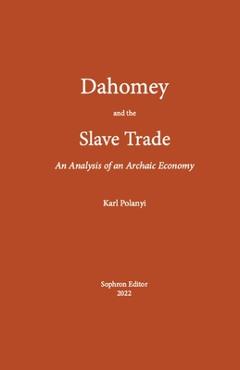Dahomey and the Slave Trade: An Analysis of an Archaic Economy - Polanyi Karl

Detalii Dahomey and the Slave Trade:
libris.ro
98.17 Lei
122.71 Lei
History
Polanyi Karl
Dahomey and the Slave Trade: - Disponibil la libris.ro
Pe YEO găsești Dahomey and the Slave Trade: de la Polanyi Karl, în categoria History.
Indiferent de nevoile tale, Dahomey and the Slave Trade: An Analysis of an Archaic Economy - Polanyi Karl din categoria History îți poate aduce un echilibru perfect între calitate și preț, cu avantaje practice și moderne.
Preț: 98.17 Lei
Caracteristicile produsului Dahomey and the Slave Trade:
Comandă Dahomey and the Slave Trade: Online, Simplu și Rapid
Prin intermediul platformei YEO, poți comanda Dahomey and the Slave Trade: de la libris.ro rapid și în siguranță. Bucură-te de o experiență de cumpărături online optimizată și descoperă cele mai bune oferte actualizate constant.
Descriere magazin:
The death of Karl Polanyi in 1964, at seventy-seven, curtailed a productive life in the fields economic history and economic anthropology. Some of his students-impressed with his erudition and disregard for the ordinary-described him as otherworldly.He was founder of the Galilei Society in Budapest, the cradle of the liberal revolutions in Hungary in the first decades of the 20th. century. In the first World War, he was a cavalry officer and after that war he went to Vienna. There he became a columnist and commentator for the Oesterreichische Volkswirt, in charge of analysis of international affairs. For years he read daily The Times, Le Temps, the Frankfurter Zeitung, all the Vienna papers and those from Budapest and others as they were relevant. He emigrated to England where he became a tutor for Oxford University and the University of London and wrote re-analysis of English economic history: The Great Transformation.After World War II, Polanyi came to Columbia University to teach economic history. His courses were always popular and well attended. During his last years at Columbia, and during his early years of retirement, Polanyi was joined by Conrad Arensberg in heading a large interdisciplinary project for the comparative study of economic systems. The volume that resulted was Trade and Market in the Early Empires, a landmark in economic anthropology and economic history.Polanyi\'s interest in Dahomey stems from one of his students who had contributed two papers on Dahomey to Trade and Market. Polanyi grew interested and, with characteristic thoroughness, read the literature on that West African kingdom. The present book resulted from these last years of productive scholarship.Dahomey and the Slave Trade was prepared for the press by his widow, Ilona Duczynska Polanyi.Foreword viiThis book is of vital importance to anthropology for several reasons, the most compelling being that the concerns of history and of anthropology are overlapped in it. Besides making available the economic history of one of the great West African kingdoms, it sets forth some new theory for economic anthropology-particularly Part III, in which Polanyi makes sense of the intricacies of trade between a people with a fully monetized economy, and one without, and those passages in which he adds house-holding as a concept to his ideas about the principles of economic integration.Polanyi\'s position in economic anthropology-not to mention the status he achieved as economic

Produse asemănătoare
Produse marca Polanyi Karl

Dahomey and the Slave Trade: An Analysis of an Archaic Economy - Polanyi Karl
![]() libris.ro
libris.ro
Actualizat in 15/12/2024
98.17 Lei